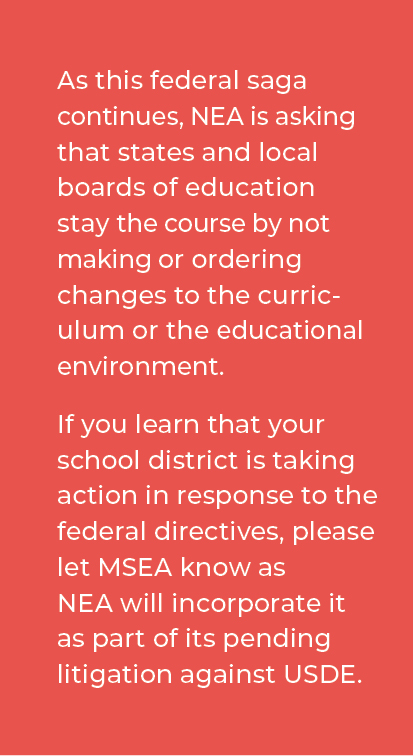A Word from Legal
USDE and DEI
Editor’s note: Since the April edition of ActionLine went to press, the Trump administration was handed a heavy blow to its assault on diversity, equity, and inclusion in not only public education, but on how we as a union help equip members to best support the needs of our diverse student population. NEA won on EVERY claim!
The District Court of New Hampshire determined that Plaintiffs were likely to succeed on their claim that the February 14 Letter is impermissibly vague. Read below for an explanation of USDE’s “Dear Colleague” letter and click here for a summary from MSEA General Counsel Kristy Anderson of the April 24 court order regarding the NEA, NEA-NH, et. al. v. Department of Education, et. al. suit to pause the effects of “Dear Colleague” letter issued by USDE.
From the April 2025 issue of ActionLine:

What They Say and What We’re Doing About It
On February 14, the Office of Civil Rights in the U.S. Department of Education (USDE) issued a “Dear Colleague Letter” under the guise of enforcing Title VI of the Civil Rights Act of 1964 and the Equal Protection Clause of the U.S. Constitution.
USDE’s Letter
The letter states USDE’s view that racial classifications and efforts to increase diversity, equity, and inclusion in education through curricular, instructional, and programmatic choices are against the law. The letter threatens that USDE intends to take “appropriate measures to assess compliance” with its view.
But the federal government has no authority over the decisions of universities, colleges, and school districts about what is taught, how it is taught, and what programming will be provided. Not only do federal education laws prohibit such interference, but federal civil rights laws permit such local decisions. Curriculum, instruction, and programming choices that recognize, celebrate, and explore the diversity of our country are lawful, valid, and necessary to provide an honest and high-quality education.
The letter reflects the position of the current administration that contradicts law. Nonetheless, enforcement began on April 3, when USDE announced that states and school districts must sign new certifications of compliance with their anti-discrimination obligations to continue receiving federal funding.
The new certification reflects USDE’s view of prohibited behavior to include the “use of Diversity, Equity, & Inclusion (“DEI”) programs to advantage one’s race over another.” What type of program would cross their line is unanswered.
Threats and Consequences?
Vague language aside, USDE makes clear that failure to comply with its interpretation of Title VI “may subject the individual or entity using such practices to serious consequences.” These include halting federal funding for any state or local board of education or educational institution that fails to comply and substantial liabilities, including litigation for breach of contract by the Department of Justice and tripling the damages and civil penalties for each perceived violation.
Requests and Responses
USDE requested that state superintendents sign the new certification and obtain certifications from school districts by April 13. NEA is seeking a remedy against the new certification and advises not signing the new requested certification, as New York recently refused to.
NEA Takes Action
USDE canceled 104 of 109 grants under two programs because of its DEI position. The canceled grants funded programs to boost recruitment and training of teachers and principals in underserved areas, including high-poverty communities. Maryland joined seven states to sue USDE in federal court in Massachusetts.
The court quickly pushed back that the eight states were likely to win, arguing that the cancellations were “arbitrary and capricious” and in violation of the main federal law that governs administrative proceedings.
The Supreme Court Steps In
In a rare move, the Supreme Court intervened on April 4, clearing the way for USDE to continue to withhold money for the teacher-training projects in the eight states. In an unsigned statement, the majority wrote that the Trump Administration was likely to win, arguing that the Massachusetts federal judge lacked authority to order the payments be made under a federal law that governs agency actions. There is no ruling on the merits, but the justices found that USDE persuasively argued that it risked not being able to claw back the grant money if it paid it out now and then
won later.

